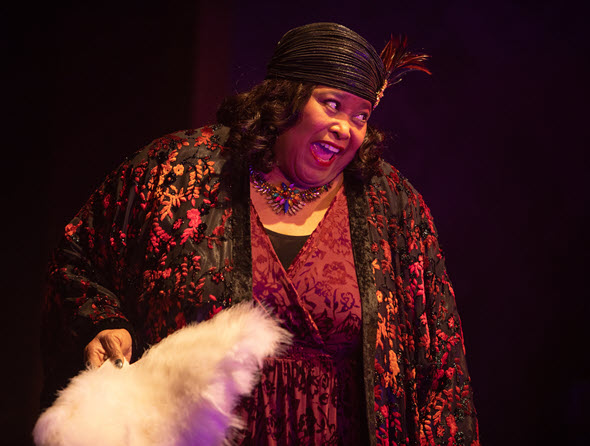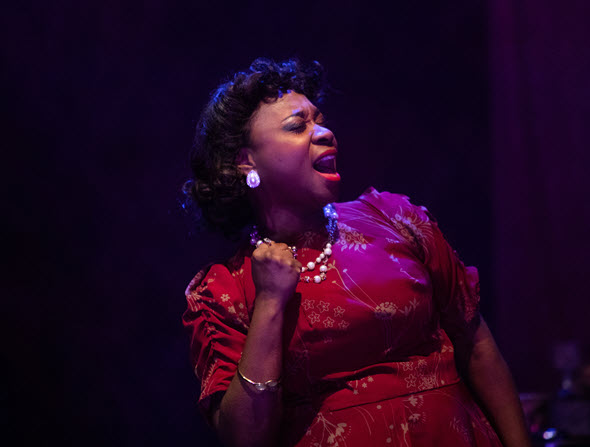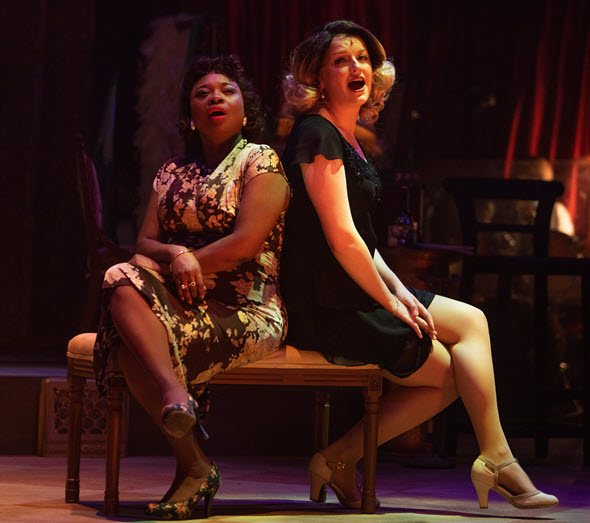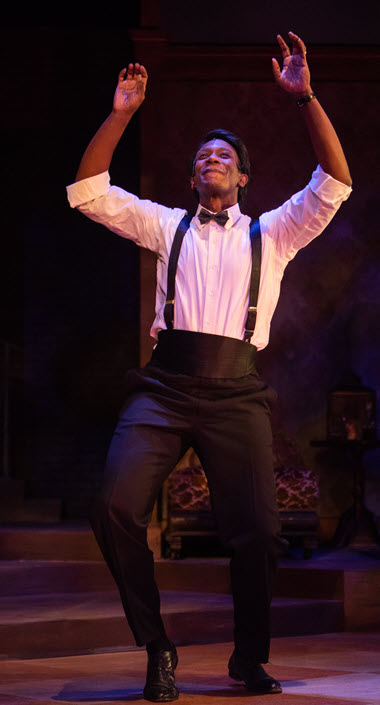Variations on faded love and broken hearts: singing universal lyric of ‘Blues in the Night’
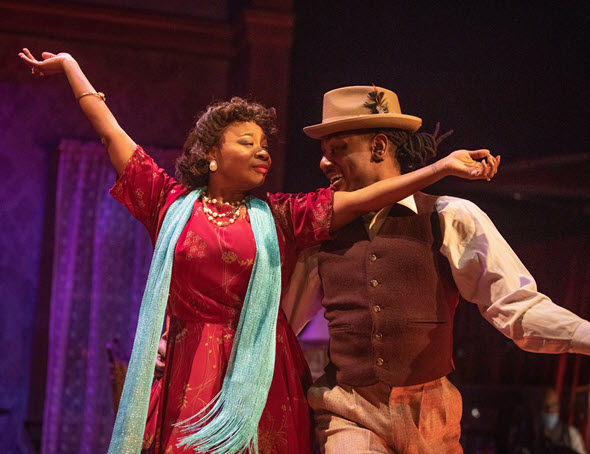
Singer Donica Lynn and dancer Terrell Armstrong in “Blues in the Night” at Porchlight Music Theatre. (Photos by Anthony Robert La Penna)
By Lawrence B. Johnson
“Blues in the Night,” a musical produced by Porchlight Music Theatre at Ruth Page Center for the Arts. Extended thru March 20. ★★★★
It’s a down-and-out 1930s hotel populated by a weary and worn-out clientele. The hotel doesn’t have a name, nor do its occupants. Black or white, they’re all in the same familiar boat, adrift late into a never-ending day, just living the song they know so well. These are the denizens of “Blues in the Night,” a sort of jukebox revue staged with existential grit by Porchlight Music Theatre.
The show hovers – I would say plays out, but like its frayed characters it doesn’t go anywhere – through an extended series of tableaux, 24 variations on loneliness, emptiness, better days remembered. It’s the downers’ side of the American songbook, the art of songs sung on the street that losers use, but nonetheless as American as it gets: a haunting show, if also a little numbing.
Meet the dramatis personae. The Lady from the Road (Felicia P. Fields), who’s been around and seen it all, tempers her melancholy with cynicism. The Woman of the World (Donica Lynn) is young, vulnerable, already wise and already scarred. The Girl with a Date (Clare Kennedy), the only white person in sight, seeks the elixir of a one-night stand. The Man in the Saloon (Evan Tyrone Martin) is a crooner – a very good one – with an eye out for opportunity. The Dancing Man (Terrell Armstrong) is the only member of this motley assembly who doesn’t sing, though he makes lyric magic with his body.
Separately or in conjoined voices, these perdurable souls sing about love, lost or found or both, the inexorable woe inflicted by a him or a her, the hard lessons learned, the readiness to take one more plunge.
As grand dame of the bunch, Fields is an endearing road warrior, complicated, unpredictable and funny. She provides an earthy lead-off in the ensemble anthem “Blues in the Night.” You believe her when she declares: “I been in some big towns, an’ heard me some big talk, but there is one thing I know. A man is a two-face, a worrisome thing who’ll leave you to sing the blues in the night.” Still, this Lady who knows the highway is ever game for someone to “Take Me for a Buggy Ride.” Giddy-up.
Lynn brings the night’s most nuanced acting to the Woman of the World. There’s an aura of expectation, as in hope, in this troubled spirit. And when she summons all her unspent youth, Lynn belts out a detailed image of her ideal, a “Rough and Ready Man.” She also joins the two other women, Fields and Kennedy, in a wee-hours turn through “Nobody Knows You When You’re Down and Out” that falls somewhere between a martini toast and a strut.
The cultural legacy of the blues is Black. Kennedy’s Girl with a Date is singularly and conspicuously white, an observation that Fields’ Lady from the Road makes with wry indulgence: “Even white women get the blues.” My mind immediately shot to Emmylou Harris singing “Even Cowgirls Get the Blues.” Yup, the blues paints its neutral color with a broad brush, as the full company affirms in one of the show’s highlights, “I Got a Right to Sing the Blues.” Kennedy also nails a blues groove in a fetching duet on “Willow Weep for Me” with Martin’s Man in the Saloon.
Though he’s outnumbered three to one, Martin by no means disappears in that ratio. Far from it. He displays the best vocal chops on that stage, in songs like the seductive “Baby Doll” and his ironic reprise of the company number “Wild Women Don’t Have the Blues.” The further the show progresses, the more you anticipate Martin’s next song.
All that said, the really spectacular artist in view is Armstrong, the silent dancer, who weaves in and out of numbers like the embodiment of the blues, a curl of smoke, lithe and agile and irresistible. Almost out of view, but in clear earshot, is another huge talent, pianist Maulty Jewell IV, who leads a superb little jazz group.
“Blues in the Night,” based on an original 1980s conception by Sheldon Epps and both directed and choreographed here by Kenny Ingram, with musical direction by David Fiorello, is an entertaining, well-made revue. As the second act winds down, the show’s single theme of the lost and bruised begins to feel repetitive; its two dozen shades of blue might be condensed to greater effect. Still, the message floats beguilingly through the night: Wherever the four winds blow, the blues waft in. Mama was right.
Related Link:
Performance location, dates and times: Details at TheatreInChicago.com

